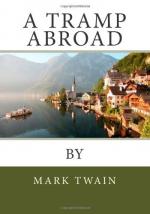Lord Douglas’ body has never been found. It probably lodged upon some inaccessible shelf in the face of the mighty precipice. Lord Douglas was a youth of nineteen. The three other victims fell nearly four thousand feet, and their bodies lay together upon the glacier when found by Mr. Whymper and the other searchers the next morning. Their graves are beside the little church in Zermatt.
CHAPTER XLII [Chillon has a Nice, Roomy Dungeon]
Switzerland is simply a large, humpy, solid rock, with a thin skin of grass stretched over it. Consequently, they do not dig graves, they blast them out with power and fuse. They cannot afford to have large graveyards, the grass skin is too circumscribed and too valuable. It is all required for the support of the living.
The graveyard in Zermatt occupies only about one-eighth of an acre. The graves are sunk in the living rock, and are very permanent; but occupation of them is only temporary; the occupant can only stay till his grave is needed by a later subject, he is removed, then, for they do not bury one body on top of another. As I understand it, a family owns a grave, just as it owns a house. A man dies and leaves his house to his son—and at the same time, this dead father succeeds to his own father’s grave. He moves out of the house and into the grave, and his predecessor moves out of the grave and into the cellar of the chapel. I saw a black box lying in the churchyard, with skull and cross-bones painted on it, and was told that this was used in transferring remains to the cellar.
In that cellar the bones and skulls of several hundred of former citizens were compactly corded up. They made a pile eighteen feet long, seven feet high, and eight feet wide. I was told that in some of the receptacles of this kind in the Swiss villages, the skulls were all marked, and if a man wished to find the skulls of his ancestors for several generations back, he could do it by these marks, preserved in the family records.
An English gentleman who had lived some years in this region, said it was the cradle of compulsory education. But he said that the English idea that compulsory education would reduce bastardy and intemperance was an error—it has not that effect. He said there was more seduction in the Protestant than in the Catholic cantons, because the confessional protected the girls. I wonder why it doesn’t protect married women in France and Spain?
This gentleman said that among the poorer peasants in the Valais, it was common for the brothers in a family to cast lots to determine which of them should have the coveted privilege of marrying, and his brethren—doomed bachelors—heroically banded themselves together to help support the new family.
We left Zermatt in a wagon—and in a rain-storm, too —for St. Nicholas about ten o’clock one morning. Again we passed between those grass-clad prodigious cliffs, specked with wee dwellings peeping over at us from velvety green walls ten and twelve hundred feet high. It did not seem possible that the imaginary chamois even could climb those precipices. Lovers on opposite cliffs probably kiss through a spy-glass, and correspond with a rifle.




